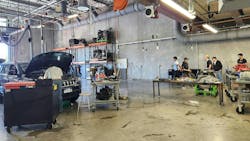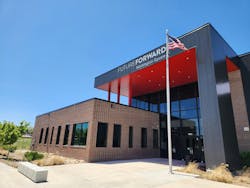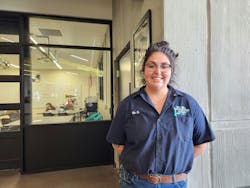Colorado vocational school tailors curriculum to future fleet needs
As many fleets have found out the hard way, overcoming the technician shortage isn’t as much about getting bodies into the shop as much as it is about skilled talent.
“When you talk to most employers, they say, 'Well, no, we've got applicants; they're just not qualified,'” George Arrants, VP of the ASE Education Foundation has previously told Fleet Maintenance.
At FutureForward at Washington Square, a vocational school in Thornton, Colorado, the teachers know this problem all too well and are forming a curriculum to ensure area fleets and shops have a steady supply of qualified techs.
One of those teacher is Ellen Gutierez, who just finished her first year as a diesel instructor after a decade of maintenance work on heavy equipment, including both shop and mobile maintenance experience. She previously attended FutureForward and after that, WyoTech in Laramie, Wyoming.
She and fellow instructor John Atkins’ goal is to refine their curriculum to address “where we see the faults in our industry, and we can help build them up,” Gutierrez noted.
In particular, Gutierez noted that she wanted to ensure her students are well-versed in electric work, hydraulics, and technical writing for their future career development.
When it comes to emphasis on electrical knowledge, Gutierrez wants her students to be ready for the rapid growth of zero-emission vehicles in the industry. This is why the class’s electrical unit is one of the longest sections, clocking in at around eight weeks of class time.
“[Electrical] is probably our largest unit because in the industry, that's where everybody is growing, and it's a huge defect,” Gutierrez commented. “Only about 30% of technicians know how to fully troubleshoot it.”
To shore up her students’ knowledge, the diesel instructor focuses on electrical basics, ensuring that they’re familiar with voltage, current, resistance, and how these forces interact. This allows her to progress to signal voltages and why a vehicle might lose power or see a voltage drop.
“If they understand the basics of why it works and how it works, they can start to troubleshoot it,” Gutierrez asserted.
Similarly, she said that she plans to extend her class’s hydraulics unit from three weeks to six for next year, simply due to the breadth of material there is to cover on the subject. This includes working with local partners to teach FutureForward’s students how to make hydraulic lines, “which was great, because it’s a skill that if you don't learn it from somebody who knows what they're doing, you're going to mess it up,” Gutierrez commented.
Read more: Tips on how shops can help auto/diesel schools
Another skill Gutierrez stated some technicians may be underdeveloped in is service writing, which is critical when it comes to making clear, detailed work orders. And especially if something goes wrong with a truck soon after it leaves the shop.
“You also have to be able to document that you worked on [that truck],” Gutierrez noted. “It's to protect the technician because if a wheel falls off and it kills somebody, and you say ‘I replaced the wheel,’ you have no proof that you did anything, no proof that you torqued it or the air pressure was right.”
Not to mention that service writing experience could unlock further career advancement if Gutierrez’s students don’t want to turn wrenches for the rest of their lives, and perhaps want to advance into a back-office role as a service writer.
“Especially as a service writer, if they have some background in how this stuff works, they're going to make a much better technical writer,” the diesel technology teacher said. “They're going to be much better at estimating jobs because they can deconstruct it a little bit further than just relying on the computer and billing out some hours.”
Giving her students these skills is part of what gives Gutierrez so much meaning in her new profession, not to mention pushing back against the technician shortage by giving new techs the skills they need to succeed.
“I'm used to being rewarded as a technician and being like, ‘Oh, I solved this. It's now running,’” Gutierrez said. “But to watch kids learn how to do this and know that you're setting them up for something really successful in a non-traditional path is awesome.”
About the Author

Alex Keenan
Alex Keenan is an Associate Editor for Fleet Maintenance magazine. She has written on a variety of topics for the past several years and recently joined the transportation industry, reviewing content covering technician challenges and breaking industry news. She holds a bachelor's degree in English from Colorado State University in Fort Collins, Colorado.


